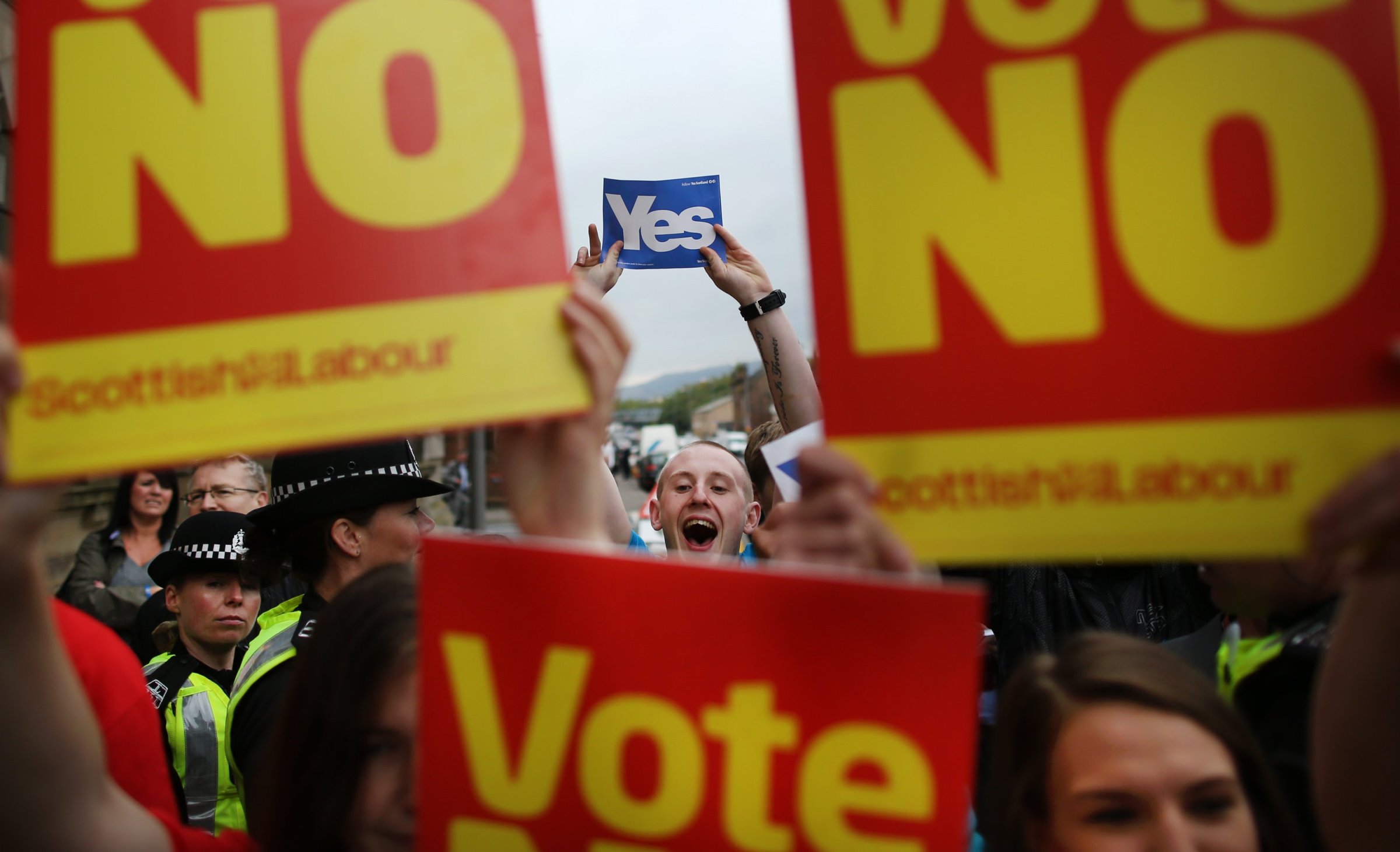
Whatever happens with the Scottish independence vote, the result will be a crushing defeat for the status quo and the UK political establishment. If there’s a YES vote, then the compelling narrative is one of a small country smashing through vested interests, and bursting into nationhood. A NO vote, on the other hand—once the relief of the last-ditch saving of the union is processed—and the story becomes about the emergence of a people’s democratic movement for change.
Through the discussions over the referendum debate, those in favor of independence have gone from 30% to 45-55%; momentum is only heading in one direction. This entire process has been a disaster for the major UK-based parties and the antagonistic mainstream London media (including the publicly-funded BBC, which came over like Pravda). They all lost massive credibility north of the border by seeing the debate as one about narrow nationalism, rather than the extension of democracy it had long evolved into.
The YES campaign, with grass-roots support and fueled by social media, have convincingly won the arguments against their NO counterparts, led (or misled), by all the establishment parties. It has been a stunning victory for the people against the elites and the out-of-touch political class. The NO campaign were forced to rely almost solely on fear tactics as the benefits and connection of the union to Scotland are either historical (industry, empire, and the esprit de corps engendered by two world wars) or currently being dismantled by the major parties, the welfare state and the NHS only being protected in Scotland due to the devolved parliament. There are not many NO votes in saying you want to use the Scottish oil revenues to fund more privatization projects to sell off state assets to the rich, or to build London as a metropolitan super state for those transnational elites.
The vote could go either way. While there is still residual loyalty to Britain, particularly amongst older Scots, many NO voters want the British state reformed, with more powers heading north. David Cameron made a terrible error in leaving the so-called “devo max”—also known as maximum devolution—option off the ballot paper, forcing voters to choose between YES and NO. Rather than the predicted rout for NO, many stampeded towards the YES camp, turning the referendum into a neck-and-neck race.
A YES vote would, for the UK, mean the loss of resources from a country that is rich in them and light on population (only 10% of UK total). For Scotland, it would seem to present massive opportunities. Arguably, however, a NO vote means an even bigger potential headache for the London political establishment. They would have to look at decentralizing more power to Scotland or have the same rerun of the independence debate in every subsequent UK election. In such a scenario they would no longer face just Alex Salmond, and his bourgeois civic nationalist party of the centre-left, but a vibrant, broad-based movement for democracy. In 1979, barely a third of Scots could be bothered to vote for an Edinburgh parliament with limited devolved powers. Now around half, and probably rising, are pro independence.
The problem with any offer of “devo max” is that without substantial powers it will be unlikely to appease the Scots. But then people in areas of England, where the unitary, centralized, status quo is perceived as working fine, may not put up with this situation. This is particularly the case in the prosperous South East, where 25 million people will feel they shouldn’t have to accommodate 5 million, and will correctly be inclined to say “go.” It would be like having a busted toilet that doesn’t flush, with the chain being pulled at every general, local, and European election: distracting, messy, and ultimately soul-destroying.
It’s hard to see the Conservatives offering more powers to the Scots, as they have no support there—the bulk of their votes being in the South of England. Equally, a focus-group and polls-driven Labour Party, their eyes constantly on middle England, are unlikely to offer up much, or stand on the genuinely radical, modernizing, democratic agenda the post-devolution generation of Scots crave. The notion of federalism for the UK, flouted as the panacea by the Liberals and some on the left, is a fantasy fuelled by the same top-down establishment thinking that has led to the current situation. Imposing an unwanted parliament on a region like East Anglia, where there has been no movement for devolution, is as fundamentally undemocratic as denying an Edinburgh one its full range of powers.
At least with a YES vote, the issue of Scotland is left up to the Scots. They can get on with building the sort of social democratic society they crave, based on a citizen’s charter, rather than entrenched hierarchy and elitism. The rest of UK, or it’s constituent parts, can then get on with deciding on the best system of government that suits them, instead of having to pander to a minority who have a different agenda.
Whether the result is YES or NO, it’s that turbulent, quarrelsome, compassionate minority, the Scots themselves, who have—quite astonishingly—won the day. At 97% voter registration, unprecedented in the Western World, they have shown that a G7 power state, mired in a neo-liberal model of globalization, can be challenged, even broken up, and a vibrant, non-militaristic democracy established. This amazing country has, to its own great surprise, lit a torch of freedom that will burn across the world.
More Must-Reads from TIME
- Inside Elon Musk’s War on Washington
- Meet the 2025 Women of the Year
- The Harsh Truth About Disability Inclusion
- Why Do More Young Adults Have Cancer?
- Colman Domingo Leads With Radical Love
- How to Get Better at Doing Things Alone
- Cecily Strong on Goober the Clown
- Column: The Rise of America’s Broligarchy
Contact us at letters@time.com